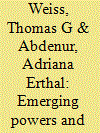| Srl | Item |
| 1 |
ID:
136048


|
|
|
|
|
| Summary/Abstract |
Since the outset, in the aftermath of World War II, the United Nations development system (unds) has constituted an essential pillar of the world organisation’s activities, along with those devoted to peacekeeping, humanitarianism, human rights and justice. Adaptations notwithstanding, serious questions remain about its effectiveness and capacity to represent adequately the aspirations of ‘we, the peoples’ – the opening words of the UN Charter – particularly in the global South. Although developing countries have joined forces at different stages in the international arena – including through the Non-Aligned Movement (nam) and the Group of 77 (G77) – to increase their voices within the system, over the past decade a new twist has been added, the visibility of emerging powers. This reality not only reflects the latter’s growing role as providers of development cooperation but also their criticism of the existing architecture for global economic governance.
|
|
|
|
|
|
|
|
|
|
|
|
|
|
|
|
| 2 |
ID:
157881


|
|
|
|
|
| Summary/Abstract |
Member states of the United Nations (UN) agree that its development system needs substantial reform given its fragmentation and outdated structures, as well as new demands from the 2030 Agenda. Yet, a recent two-year reform process yielded no substantial reform decisions. Why did member states fail to endorse the necessary reforms despite almost unanimous recognition of the need for change? This paper describes member states’ conflicting positions on reforming the UN and analyses their failure to delegate authority to the UN development system. North and South, donors and recipients, are locked in a struggle for power and control, maximising bilateral influence at the expense of the benefits of multilateral cooperation. The paper contributes to the pool of UN studies, adding a decidedly political perspective of the reform process. It is based on diplomatic statements, negotiation drafts and interviews with UN diplomats.
|
|
|
|
|
|
|
|
|
|
|
|
|
|
|
|